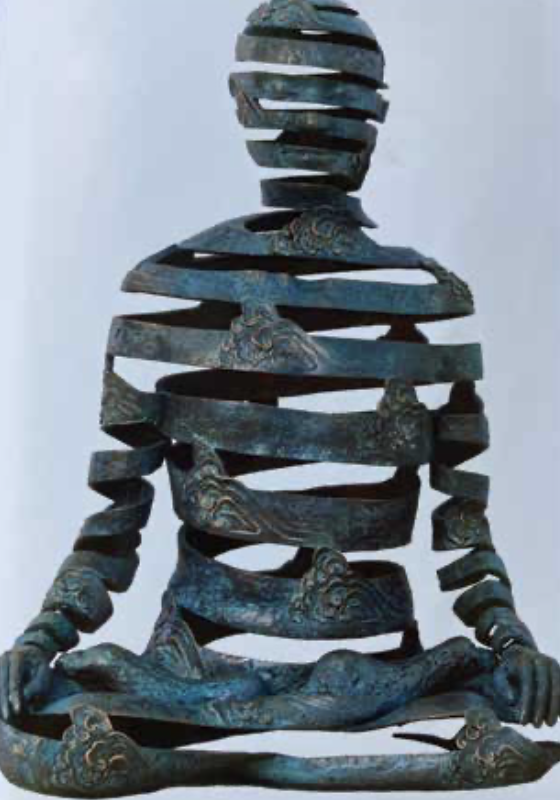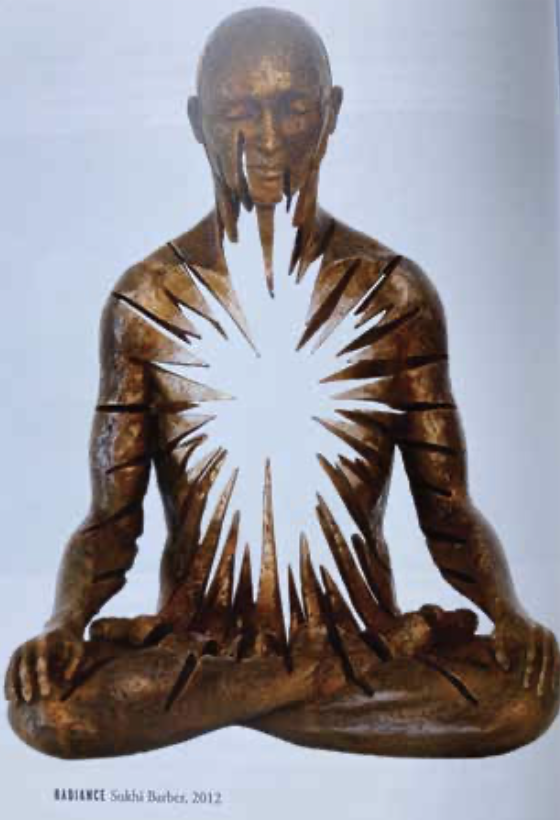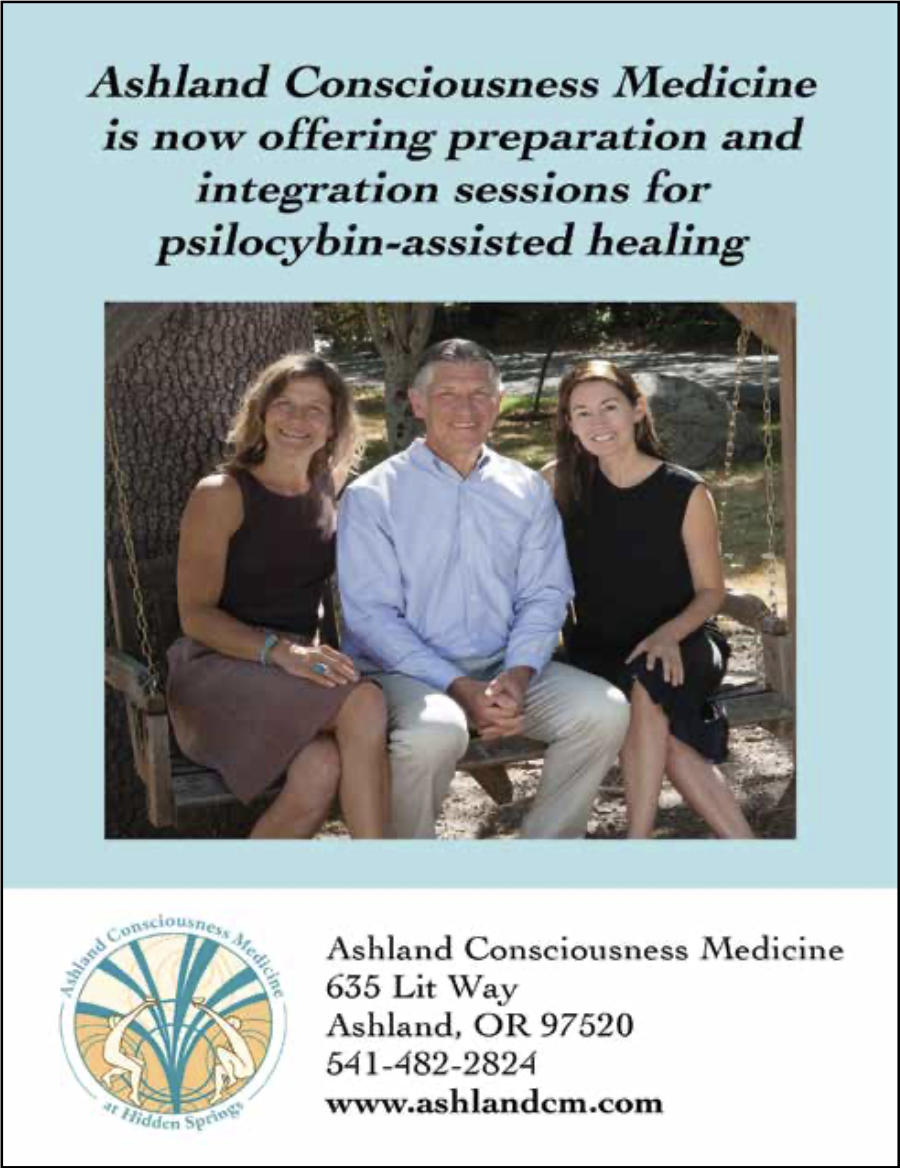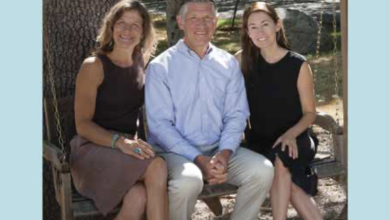Dr. Ian Luepker Ashland Consciousness Medicine
Introducing Dr. Ian Luepker. Traditionally trained as a naturopathic doctor, Dr. Luepker has been in practice 21 years, 17 of those in Ashland. He has 12 years of experience working on psychiatric units. Now, with his practice Ashland Consciousness Medicine, he introduces Ashland to its first psychedelic medicine clinic using ketamine-assisted psychotherapy. He is also providing psilocybin-assisted therapy at a local psilocybin service center, Omnia Group Ashland. In this interview I speak with Dr. Luepker about his practice and work here in Ashland, Oregon. We examine the vast potential, limitations and implementation of psychedelic medicine.
Dr. Luepker, hello and welcome to LocalsGuide.
Thanks for having me. I am excited to do this interview with you and discuss the healing potential of psychedelic medicine with the community.
Dr. Luepker, please introduce us to your practice, Ashland Consciousness Medicine, Ashland´s first psychedelic medicine clinic.
Over the last decade I’ve been watching the interest in psychedelic medicine grow. I’ve been following the research at Johns Hopkins, NYU, UCLA and other leading organizations and became very excited about the immense potential of combining psychedelic medicine with psychotherapy. When Michael Pollan published his book, How to Change Your Mind, the psychedelic medicine “renaissance” really picked up momentum.
Feeling inspired, I founded Ashland Consciousness Medicine (ACM) at Hidden Springs Wellness Center in October 2021 with Dr. Michelle Beinick and psychotherapist Martha McCord. At that time, ketamine was the only legal psychedelic available for this type of work. Since opening, we have administered nearly 400 ketamine administrations combined with psychotherapy. Now that Measure 109 passed and psilocybin service centers are beginning to open, we have another legal medicine available to assist in this profound therapeutic approach.
Dr. Luepker, what is psychedelic medicine?
The word psychedelic comes from Greek and means “mind manifesting.” Psychedelics expand consciousness and enable people to explore their mind, the cartography of consciousness. A compassionate and curious exploration of mind supports people to overcome their habitual thought patterns. Psychedelic-assisted psychotherapy is the use of psychedelics in conjunction with psychotherapy in order to amplify, explore and integrate what is already in our consciousness. When we see things clearly, and feel it in the body and heart, we can change our habitual patterns of emotion, thought and sensation.
Dr. Luepker, please tell us a little bit about the recent history of psychedelics.
Since the 1960’s, Western-trained clinicians such as Stanislov Grof, MD and Joan Halifax, PhD have been investigating LSD to assist people facing existential distress around their terminal illnesses. Currently, Roland Griffiths, PhD, a researcher at Johns Hopkins University School of Medicine and founder of the Center for Consciousness and Psychedelic Studies, has been researching psilocybin’s application for end-of-life anxiety and depression. (As an aside, there is a fantastic discussion/podcast between psychologist Tara Brach, PhD and Rolland Griffiths discussing his work and her psilocybin experience! https://www.tarabrach.com/meditation-psychedelics-mortality-conversation/)
Dr. Luepker, you say that healing is a verb, health is not a noun. What do you mean by this?
Healing is a lifelong process and rarely linear. When you are working with complex, chronic mental health conditions and the human condition, there is an active and ongoing healing process right up to our last breath. I worry that the way in which the media has portrayed psychedelic medicine is misleading, i.e., as yet another “magic bullet.” Psychedelic medicine involves an active engagement on the part of the client; it’s not a passive engagement. I wish to emphasize that it is unrealistic to think that you’ll come in, receive 3 grams of psilocybin, and have an experience that heals everything that has ailed you throughout your life. That simply isn’t realistic… with any type of medicine or therapy. I wish healing were that easy, but unfortunately, it is not.
So this is not a one and done fix-it solution. Please say more.
This is not “fast food medicine,” by contrast it is slow medicine and much deeper acting. We live in a culture where we just want to pop a pill and make all the suffering magically disappear. This happens in both conventional and alternative medicine. Psychedelic medicine is not just about “fixing” people. We are enabling profound insight and resourcing people, both internally and externally. This type of change has a lasting impact on behavior, but it is far from a “quick fix.” It is a longer road of healing. It is not uncommon that after someone has had a psychedelic therapy session they realize how much is beneath that initial layer of healing that first brought them in for treatment. This is not a “one and done” intervention, and not for everyone. We are peeling back the layers of the onion, so to speak. Some of these layers can go back to early developmental, pre-verbal childhood experiences. Some of them are a product of intergenerational trauma. Consciousness is vast and suffering is complex.
Dr. Luepker, please tell us about psychedelic medicine in the state of Oregon.
Oregon is the first state to legalize the therapeutic use of psilocybin. Ballot measure 109 passed in 2020, and was codified into law as ORS 475A. Now, three years later, licensed service centers and facilitators are open and providing care. It has been a long road to get here. And rather remarkable that we’ve arrived!
Oregon was also the first state to pass a Death with Dignity Act which enabled Oregonians to make choices at the end-of-life and to have access to physician aid in dying. I feel very proud to live in such a progressive state that leans toward liberty for consciousness and choices around death and dying. Our bodies, our choice (in terms of reproductive rights) is akin to “our consciousness, our choice.” Psychedelics are comparatively very safe and I do not believe the government should hinder the freedom to explore our own minds with them.
Many major research universities are now jumping on the bandwagon to get behind this movement for psychedelic medicine. Please talk more about this.
Yes, now that the drug war is slowly beginning to ebb, there is more research being done on the benefits of these medicines. The Multidisciplinary Association for Psychedelic Studies (MAPS) has been studying MDMA for treating Post-Traumatic Stress Disorder (PTSD). MAPS is nearing completion of the research process required by the FDA and predicts it will be rescheduled and available by 2024. MDMA will be the first medicine to pass through the FDA process that mandates psychotherapy to be used along with the medicine. New York University researchers Anthony Bossis, PhD, Jeffrey Guss, MD and Stephen Ross, MD and Charles Grob, MD at UCLA have been researching anxiety and depression related to life-limiting cancer diagnoses. Many research universities worldwide have jumped on the bandwagon…Yale, Stanford, Northwestern, University of Chicago, Columbia… just to name a few!
Dr. Luepker, please tell us about the different components of your practice and the services that you offer.
I like to say that: It‘s not what you use, it’s how you use it. With my work, I aim to create a structure and container that is prepared to hold whatever experience arises during someone’s psychedelic journey. I am unable to know ahead of time what might emerge from the depths of someone’s consciousness. But careful screening and ample preparation amplify the potential for beneficial outcomes. Clinical psychology provides clear indicators for who will likely have a healing experience and who might struggle during a session (though difficult experiences can still be healing). These medicines are double-edged, they have the potential to heal, and they potentially can harm (if not used carefully). This is why we provide a medical evaluation and psychological screening with a doctor and psychologist before the medicine session. We rule out medical and psychological conditions that are contraindicated with psychedelics.
And each psychedelic has a different profile in regards to this. Secondly, there needs to be enough preparation before the journey and this really depends on the individual’s healing trajectory: How much previous work have they done? Have they had past psychedelic experiences and how did they go? Is there buried trauma that hasn’t been processed? Is there a substance-use disharmony that might interfere with treatment? These are variables that we need to assess and take into account during preparation. Then, after the medicine session, we integrate and “land” the experience into daily life. Anyone can go to the mountaintop and have an epiphany, but what matters is when you come back down to the valley of your life, what do you do with that epiphany? Everything that psychedelics bestow will eventually fade, and if not integrated, the experience will eventually become a memory just like every experience.
What types of situations are best addressed by this type of medicine?
Each medicine has a different capacity and range. Psilocybin shows the most promise for working with existential distress at end-of-life, depression, anxiety and spiritual inquiry. When we explore the roots of depression and anxiety, the relationship with mortality often emerges as a highly relevant undercurrent. Psilocybin can confer a direct experience of our interconnectedness: with the earth, with others and with all the parts that constitute our being. This interconnectedness is combined with the fleeting and impermanent nature of this lifetime. The reality that we are mortal and will, ultimately, lose everything we love. How do we simultaneously continue cherishing and loving while letting go of everything we love? Each moment is like this. Research shows that taking psilocybin at the end of life can elicit mystical experiences that can lead to remission of depression and anxiety for months, sometimes after just one medicine session. These experiences support people with life-limiting illnesses to fully live the life they have remaining with more gratitude and love rather than fear and dread. Even without a life-limiting illness, psilocybin can help people come to terms with their mortality, and live from a place of deep gratitude and awe for this gift of life.
Ketamine has a different scope and wide range of action. Dosage really matters. Ketamine is indicated for depression and specifically, suicidal depression. I’ve seen it save lives. Ketamine is helpful for anxiety and panic attacks. Also, ketamine is useful in providing a softer and more gentle approach to working with trauma. However, MDMA seems to be the best medicine for working with trauma as demonstrated by the research from MAPS.
What is radical self-acceptance and radical self-love? How does this come into play with the work that you do?
I am borrowing these concepts from Tara Brach, PhD, a meditation teacher and psychologist. Her work is very inspiring to me! In my opinion, healing is about a movement toward wholeness and becoming fully human.
Healing is an ongoing, life-long process of generating radical inclusivity and acceptance of all of our parts: the shadow and the light. Carl Jung once said, “I’d rather be whole than good.” We become whole and heal when we stop pushing away, collapsing into or dissociating from aspects of ourselves we dislike or would prefer to ignore. When we start to cultivate a more loving, compassionate and courageous relationship with these parts: the sadness, anxiety, fear, and wounded parts… We come to learn about them, relate to them, and can listen to what they want to teach us. None of these parts are “bad” per se, they are generally driven by our survival instinct as humans and often are here to teach us something.
Cultivating radical self-love, self-compassion, self-acceptance and self-forgiveness support us in the process of returning home to our Self. In Carl Rogers’ words, “the curious paradox is that when I accept myself just as I am, then I can change.”
“You’ve got to feel it to heal it.” Please explain this.
We don’t heal by pushing away feelings. They are here for a reason. They need to be felt and integrated into the whole of who we are. “Feel it to heal it” is a common psychedelic slogan that I feel passionate about. Repression and suppression of feelings rarely heal us in the long run. Though there are exceptions to this, in general, repression creates more problems down line. This is connected to another common psychedelic slogan that is closely related: “that which we resist, persists.” In conventional cognitive behavioral talk therapy, you can spend years talking about feelings but never really healing. When we drop into the heart, and really feel it… then land it in the body, we can start to integrate the gestalt of our human experience. It is a very holistic approach. Much closer to the human experience. This is the advantage to combining psychotherapy with psychedelics. It is easier to get out of our head and into our heart and body when in a psychedelic state.
Please share a case example in which you have seen create positive change and healing.
I worked with someone diagnosed with PTSD who suffered from severe childhood physical and emotional abuse. The abusive parent had died years ago, and this individual had never really forgiven them. Just the thought of this parent triggered anger and resentment years later which played out with every one of their relationships. During their ketamine session, they had a clear vision of that abusive parent being severely abused by their parent’s parent, i.e., the grandparent of this client. They started sobbing, flooded with emotion… and then immense compassion arose from the direct recognition that the trauma had gone from their grandparent, to their parents, and ultimately, to them. This deep upwelling of compassion for their own parent’s abuse led to a feeling of forgiveness and reconciliation. This case, and others like it, gives me hope that we can heal intergenerational trauma and break the cycle of it.
What are your hopes for people using this type of medicine?
Again, healing is a verb and health is not a noun. I am not looking to fix anyone. On some basic level, there is nothing to fix. I believe that healing comes from wholeness, a radical inclusivity and self-acceptance. An integration of all the parts: the wounded parts and their compensations. When these parts stop being the enemy that we attempt to cover up with the myriad ways our culture uses to cover up the pain – alcoholism, workaholism, consumerism, opioids, some medications, substance-use-disharmony, spiritual bypassing, social media, reckless promiscuity – we can begin to integrate and love all of what makes us so human. Love is not a gated community.
Dr. Luepker, please tell us more about your own background and training.
When I reflect on what has led me to this point in my practice, I see a confluence of three primary currents: I was living/traveling in India, Nepal and Bhutan between 1993-1996 where I was studying and practicing meditation. This helped me to begin to self-witness my mind and gave me a framework to understand the nature of suffering. Secondly, starting naturopathic medical school in 1998, I became immersed in studying the mind/emotion/body connection through a holistic lens. Thirdly, moving to Ashland in 2006 and discovering the Mankind Project through local Bill Kauth which led to a weekly men’s group that was “shadow-work” based. This allowed me to be vulnerable within a loving space and continue my healing process within a community of brothers.
Do you have any final thoughts or comments you would like to share with our readers?
I want to say that psychedelic medicine is not necessarily good medicine for everyone! It is not the panacea that the media sometimes portrays it as being. It takes a courageous willingness to want to explore what is in our consciousness, and this courage merits reverence and diligence on my part. Set and setting are very important, and these medicines are most beneficial when used in a diligent and well-planned out manner.
In conclusion, what is the best way for any of our readers to learn more and take the next steps in working with your practice.
If any of this sounds like it would be beneficial, please reach out. I offer complementary “meet and greets” to see if this healing path is a good fit for you! Karen, our wonderful front desk staff at ACM will be happy to take your call and set up an appointment. Be well.


